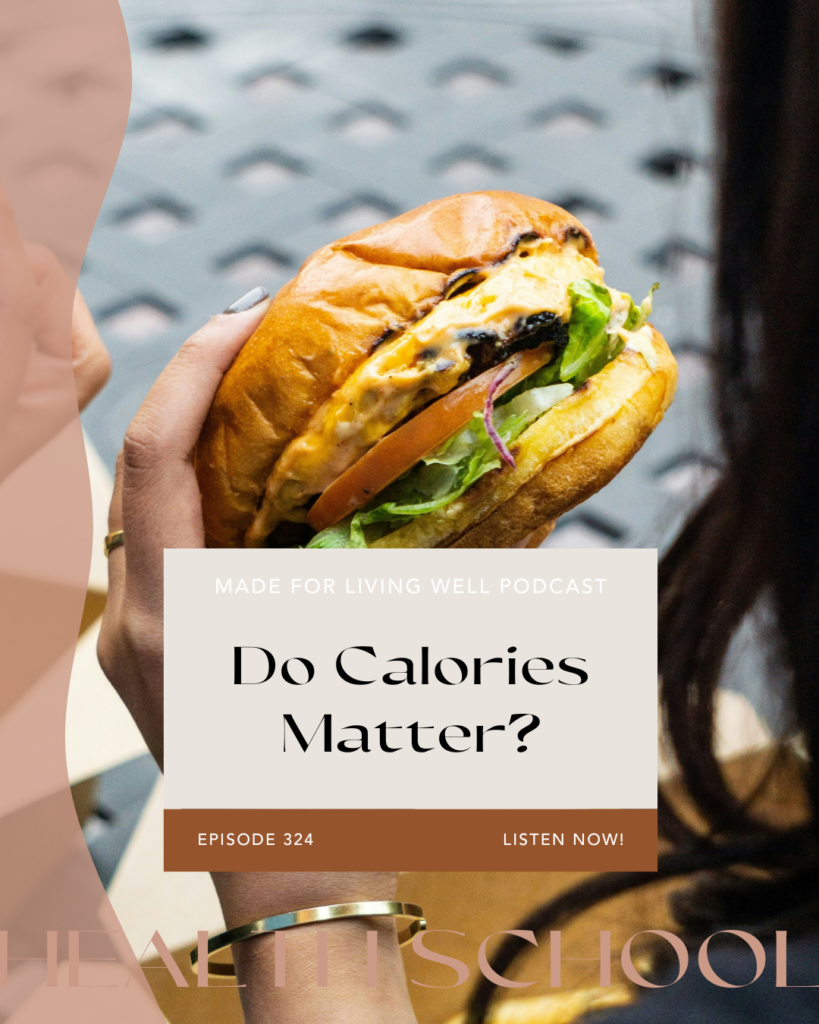
Listen on iTunes | Listen on Spotify | Listen on YouTube | Review the Podcast
Calories tend to be another controversial and somewhat confusing subject. But I’d argue that is only because we don’t understand how they interact with our bodies. If you’ve ever wondered if calories matter, the answer is yes and no.
Let me explain.
Calories are a metric of energy often used to describe the nutritional value of food. Technically, a calorie is a unit of energy equivalent to the heat energy needed to raise the temperature of 1 gram of water by one degree Celsius.
Our simplistic view of calories does not determine nutritional value. It’s the nutrients within those calories that truly matter. Calories are only significant to the degree they influence energy levels.
Understanding this is much easier when you break through the misunderstanding of energy and thus understand the role of food. In this podcast, we dive deep into the misinterpretation of caloric energy while diving into the only thing that matters: your internal energy.
Calories cannot change you, but they can influence your internal energy, which matters more than how many calories you consume.
Health is not what you eat but how your body reacts to what you eat. Health is what your body chooses to do with what you consume, and that is based on how it alters or supports your energy.
The role of food is to support your energy. That happens based on the nutrients, not calories, within it.
Do Calories Matter?
While it’s definitely true that a calorie is a calorie, no matter what, I think the bigger argument is what your body is doing with those calories.
Asking if calories matter only distracts you from the real issue. What is your body doing with the food you provide?
If I presented you with 100 calories of soda and 100 calories of fruit, it wouldn’t take you long to tell me which is healthier. You know it’s the fruit. The argument would be that it has more nutrients.
As the first law of physics proves, energy is not about adding or subtracting but only influencing. In health, that means it’s not about how many calories you consume but how those calories interact with your internal energy.
When it comes to food, that happens not through caloric energy but nutrient energy.
THINK NUTRIENTS OVER CALORIES
The role of food is nourishment—it’s nutrients. When you learn to eat for nourishment, things change. Plus, it takes a whole lot of pressure away when you know counting calories isn’t going to change you. It’s always about nutrients.
How Food Influencees Your Energy
What you eat, how you live, and even your relationships influence your energy. Everything does, making the goal of health to do more things that support your energy and less that drain it.
When it comes to food, it too has the power to influence your life in positive or negative ways. Of course, it’s difficult to say what foods are doing this because it will change throughout your life.
There will be some points where carbohydrates are filling and other times when they are draining. Just like anything, you have to pay attention.
But I can give you some general ideas based on the body’s nutrient needs and what foods contain those to provide you with boundaries you can thrive within.
These are what I call metabolic active or draining foods (learn more about pro-metabolic eating here).
Five Energy-Supporting Foods
Energy-rich foods are nutrient-dense foods. These include foods such as:
- Protein-rich foods sourced from grass-fed or pasture-raised animals: meats, eggs, dairy, and bone broth
- Root vegetables such as sweet potatoes, potatoes, squash
- Seasonal fruits
- Natural sweeteners such as honey and maple syrup
- Whole grains in small amounts, such as rice and oats
Five Energy-Draining Foods
You should limit these foods that are hard to digest, void of nutrients, and steal or conserve energy. They include:
- Vegetable oils such as canola, soybean, and vegetable oil
- Fortified grains such as cereals, bars, and bread
- Processed sugars
- Excess nuts and seeds, especially milk, flour, and nut butter.
- Tons of raw greens
You could also add alcohol and synthetic energy sources like caffeine to the list. Artifical energy mimics real energy, which diminishes your internal flow of it. We’ll get into this in a later lesson in Health School.
Make A Personal List
I can’t tell you exactly what you should or shouldn’t consume. No one can. It will change throughout your life. The best-case scenario is that you pay attention.
Take time to make a list of foods you consume that bring you energy and make you feel good and, likewise, what doesn’t. If foods leave you feeling tired, bloated, cravings, or brain fog, those are not energy-supportive foods.
You may like them and can continue consuming them, but work to balance that with energy-filling foods.
Your basal body temperature can help you get a more accurate reading of whether that meal or food supports or hurts your energy. Your temperature should increase slightly after eating. If it declines, you know it is not supportive of your body.
Stop fixating on how much. Quantity doesn’t matter as much as quality. Continue asking, how is this influencing or altering my internal energy?
TAKE BACK YOUR METABOLISM + BUILD METABOLIC FLEXIBILITY
If you want to learn more about energy and what to eat to see change and thrive, check out Health Made Simple.
It’s a course I created that lays the foundation of health. A framework you can use no matter where you are starting from. Health is not complicated. Learn the simple way to live it out and energize your entire life.
“Health Made Simple blew my mind. I cannot tell you how much understanding I gained. Alexa has changed my entire outlook on health. I especially loved the practical steps and guides I used, which changed my relationship with food and my body, making health feel possible for the first time in a long time. Taking this course has been the best decision.” – Cindy L.
